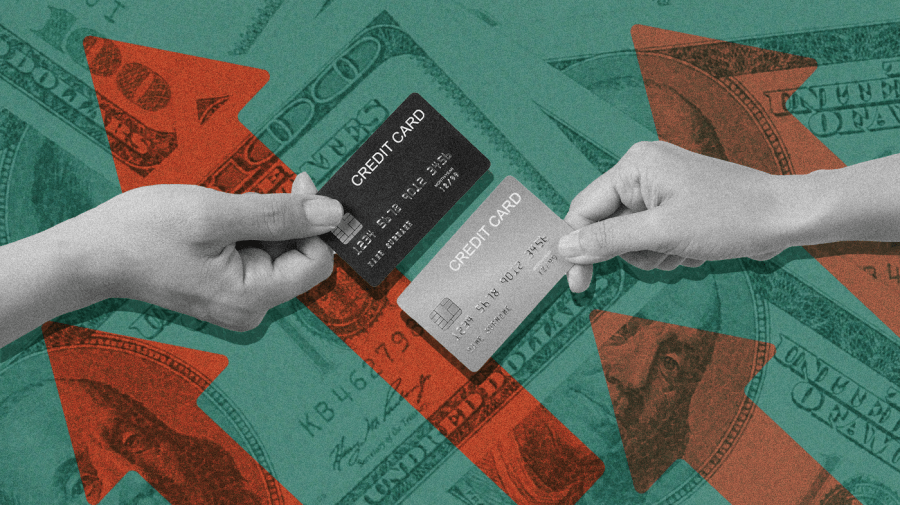Democrats blast ‘dangerous’ Capital One-Discover merger

- Oops!Something went wrong.Please try again later.
- Oops!Something went wrong.Please try again later.
A proposed Capital One-Discover merger drew swift backlash from some Democratic lawmakers and consumer advocacy groups who say the deal could reduce competition and increase fees and costs for consumers.
“With a merger this size, the regulators need to ensure our financial system remains strong and competitive, so that consumers continue to have access to safe, affordable financial products and services,” said Senate Banking Committee Chair Sherrod Brown (D-Ohio).
“A rubber-stamped merger that makes powerful financial companies even bigger and more powerful will do nothing for families,” he added.
Capital One announced Monday that it would acquire Discover Financial Services in a $35.3 billion, all-stock deal. The deal could close as early as late 2024, pending approval from regulators and shareholders of the two companies.
“Our acquisition of Discover is a singular opportunity to bring together two very successful companies with complementary capabilities and franchises, and to build a payments network that can compete with the largest payments networks and payments companies,” said Richard Fairbank, founder, chairman and CEO of Capital One.
The merger would help “transform the payments and banking marketplace,” Fairbank added.
But Sen. Elizabeth Warren (D-Mass.), a Senate Banking Committee member, urged regulators to block the proposed merger.
“The merger of [Capital One] and [Discover] threatens our financial stability, reduces competition, and would increase fees and credit costs for American families,” Warren wrote on X, the platform formerly known as Twitter.
Brown and Warren are both up for reelection this cycle. While Warren is almost sure to win reelection, Brown is facing one of the toughest races as Republicans vie to win back the Senate in 2024, according to the nonpartisan elections handicapper Cook Political Report.
“This Wall Street deal is dangerous and will harm working people. Regulators must block it immediately,” Warren added.
Warren isn’t alone in calling for federal regulators to block the merger.
“The Capital One—Discover deal will create another colossal too-big-to-fail bank while supercharging consolidation in the credit card sector,” said Shahid Naeem, senior policy analyst at the American Economic Liberties Project, a nonprofit that supports stricter antitrust policies.
“Greenlighting the creation of the nation’s sixth-largest bank and the largest credit card issuer is indefensible, particularly as the harms of bank and credit card consolidation are already causing enforcers and Congress to chart a stricter approach to both.”
Sheila Bair, former chair= of the Federal Deposit Insurance Corporation, said it was “ironic” the credit card giant was using “equity, not debt, to finance” the deal.
“Proposed CapOne acquisition of Discover driven by profitability of the card industry which is driven by consumers overcharging, carrying balances, and paying hundreds of billions in interest and fees,” Bair wrote on X.
Liz Zelnick, director of the economic security and corporate power program at the left-leaning Accountable.US, urged federal regulators to take a “hard look” at the deal.
“Even less competition under this merger means these companies will have less incentive to check their greedy practices that nickel and dime consumers into the billions of dollars,” Zelnick said.
The Capital One-Discover merger brings together two of the largest players in the credit card market. The Consumer Financial Protection Bureau (CFPB) released a study last week that found smaller issuers offered lower interest rates than the 25 largest credit card companies during the first half of 2023.
According to the CFPB report, the lower rates from a smaller bank could save consumers an average of $400 to $500 per year. Those savings are significant amid record-high American credit card debt, which topped $1.1 trillion in the fourth quarter of 2023, according to the New York Federal Reserve.
The Consumer Bankers Association (CBA), a trade group representing major U.S. banks, pushed back on the report as “misleading,” noting that while the report focused on annual percentage rate, the analysis fails to take into consideration the range of products offered and their varying interest rates, fees, and rewards and benefits packages.
“Rather than bolstering this already highly competitive and well-regulated market, the CFPB seems to be driving consumers to a one-sized-fits-all world, focused on specific criteria that the CFPB chooses, as opposed to the preferences of the people we should all be working to serve,” said CBA President and CEO Lindsey Johnson.
The proposed deal comes at a tense moment in Washington for mergers, particularly in the credit card industry.
There has been increasing bipartisan support for a bill that would mandate more options in the credit card payment network market, which is currently dominated by Visa and Mastercard. Senate Judiciary Chair Dick Durbin (D-Ill.), the bill’s sponsor, has scheduled a hearing on competition in the credit card market for April.
A spokesperson for Durbin declined to comment on the merger.
For the latest news, weather, sports, and streaming video, head to The Hill.

